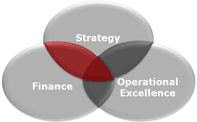
Europe's central bankers appeared to calm jittery markets despite refusing to accelerate measures to support ailing eurozone economies in the aftermath of the Irish bailout.
The European Central Bank president, Jean-Claude Trichet, said he would keep giving banks unlimited liquidity well into next year but made no guarantee to step up the bond-buying to combat investor panic surrounding Portugal and Spain.
Investors initially sold the euro and increased the cost of insuring eurozone debts after Trichet's comments, but a closer reading of his remarks and analysis of market activity later showed that the ECB was involved in large-scale behind-the-scenes support to bond markets.If you ever played Monopoly, you learned that by managing your cash flow wisely, you could buy a bunch of houses and hotels -- and win. If you didn't manage it well, you might wind up in jail or penniless.
Small wonder that aside from bankruptcy and audit, the term cash flow is probably the most terrifying in an entrepreneur's dictionary. According to a survey by Intuit, 22 million of the nation's smallest business are waiting for approximately $1,500 in overdue payments every month, creating a $33 billion logjam on their cash flow. In the same survey, 42 percent of business owners said they stay up nights worrying about how quickly they will be paid.
Obviously, the money your customers give you is cash flowing "into" your business, and the checks you're writing to pay salaries, suppliers, utilities and others constitutes the cash flowing "out" of your business. And as entrepreneurs know, a positive cash flow is the holy grail for all business owners.
BCE, Citigroup, Comisia Europeana, FMI, Federal Reserve, Germania, Grecia, Irlanda, Marea Britanie, PIB, Rusia, SUA, Spania, Standard & Poor's, Ungaria, Uniunea Europeana, economie, obligatiuni, zona euro





